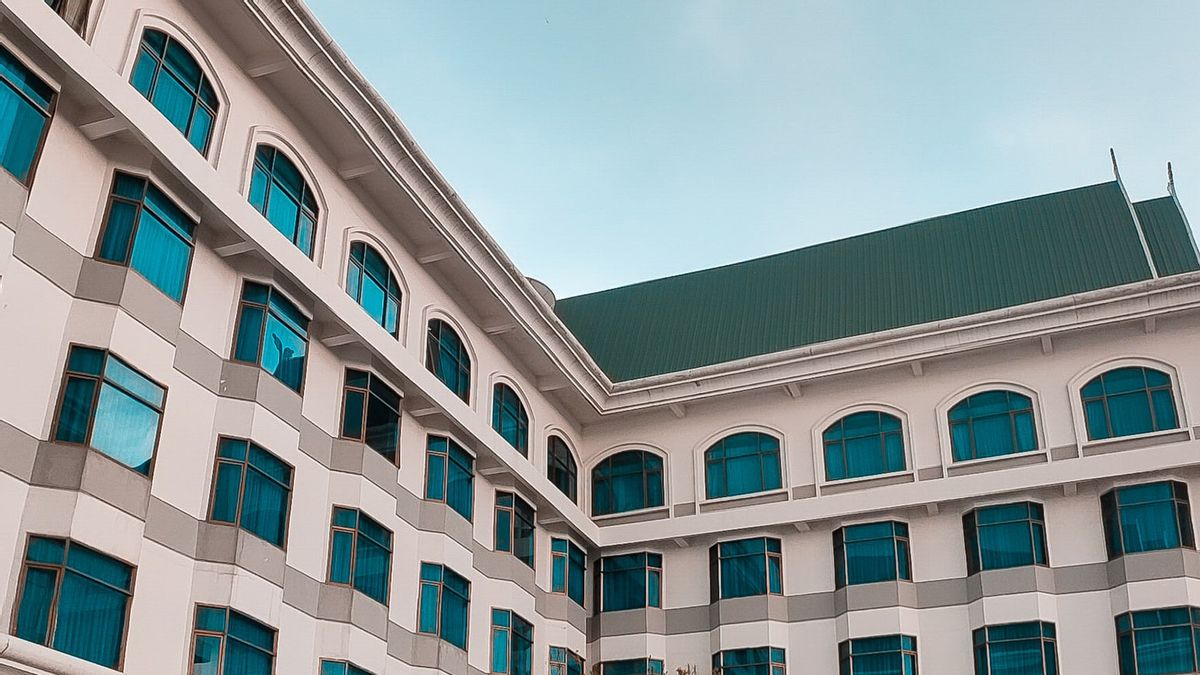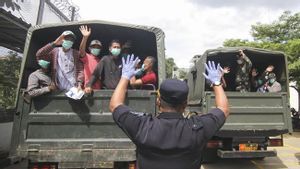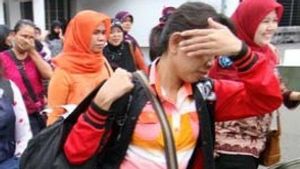JAKARTA - The prolonged restriction of community social activities due to the COVID-19 pandemic has decreased the occupancy or occupancy rate of hotels and restaurants. Therefore, the government is deemed necessary to help this business sector survive because the fate of the hotel and restaurant industry is increasingly critical.
Chairman of the DKI Jakarta PHRI Regional Leadership Agency, Sutrisno Iwantono, said that the occupancy rate of hotels and restaurants in Jakarta during the COVID-19 pandemic dropped drastically. In fact, according to him, only under 20 percent remains.
"The occupancy rate has actually decreased in the past 5 years, from about 70 percent to about 56 percent. Now maybe some are below 20 percent. It must be bleeding. It's very heavy, it is certain to lose a lot because the cost burden will not be covered," he said, in Jakarta, Sunday, January 17th.
Sutrisno said, even though he was bleeding, the hotel must continue to run its business, not stop. Because, if it is stopped now, the losses will be even greater.
Furthermore, Sutrisno said, if in the next two months there has been no improvement, it will be even more difficult for hotel and restaurant entrepreneurs to survive amid the COVID-19 pandemic.
According to Sutrisno, the current condition of the hotel and restaurant industry is still slumping and has not experienced any significant recovery. This is because the high level of COVID-19 transmission has made some people tend to refrain from traveling.
This condition is reflected in the long holidays of Christmas and New Year 2021 which did not have a significant impact on the hotel and restaurant sector. Because, there are travel regulations that make people finally cancel their intention to go on vacation.
"If I hear it is not too big and significant because people who are supposed to go to Bali are required to have complicated antigens, so that at that time there were about 133 thousand more tickets that had to be canceled that could not go to Bali, and many hotel orders had to be canceled," he said.
However, continued Sutrisno, several hotels continued to operate despite losing money. The goal is no longer to pursue profit but only to minimize losses, rather than not operating at all.
Therefore, he asked the government to continue to address health problems first. According to him, if this health problem can be handled properly, this will foster confidence for the middle and upper class who have money to consume in hotels and restaurants.

"Health problems are a determining factor. The priority of improving health must be higher," he said.
Government meetings in hotels and restaurantsPHRI DKI asked the government to help the hotel and restaurant business sector by holding meetings or meetings at hotels and restaurants in the Jakarta area.
Currently in Jakarta there are 991 hotels. Consisting of 397 star hotels, 594 non-star hotels, and dozens or even tens of thousands of restaurants that have been hit by the COVID-19 pandemic.
The hotel occupancy rate continues to decline. During the last 5 years, from about 70 percent to about 56 percent, but now the occupancy rate of hotels and restaurants is below 20 percent.
Head of BPD PHRI DKI Jakarta, Sutrisno Iwantono, said that hotels and restaurants are the sub-sectors that are worst affected by the pandemic and are predicted to have the last recovery compared to other sectors. Therefore, the government must help this sector survive.
"Fixing the demand for our current business is very, very far from standard conditions. The activities of government meetings and state-owned enterprises should be encouraged again in Jakarta so that they can provide jobs to hotels and restaurants," he said, in Jakarta, Sunday, January 17th.
[/ read_more]
Not only that, to help increase hotel occupancy, BPD PHRI DKI Jakarta also proposed that the government make a special program so that both foreign and domestic tourists stay in Jakarta for a few days.
"So they stay at our hotel, eat at our restaurant and visit various tourist objects," he said.
On the other hand, Sutrisno admitted that he agreed to build the Awakening Movement so that hotel and restaurant business actors would not get worse and could rise in 2021, so as not to cause severe losses to owners.

Sutrisno also asked the government to help alleviate the economic burdens and costs that could cause the industry to collapse. For example, PB1 taxes, Corporate Taxes, PBB, advertisement taxes, groundwater taxes, electricity costs, labor levies and other levies should be mitigated.
"Taxation for hotels and restaurants / small shops must be relaxed. Taxes are final, the figure of Rp. 4.8 billion for small businesses is currently considered too small, and should be increased to at least Rp. 7.5 billion," he said.
Ask the PSBB rules for hotels and restaurants to be relaxedNot only that, PHRI DKI Jakarta has asked the government to ease the imposition of large-scale social restrictions (PSBB) for the hotel and restaurant sector. This is because this business sector is claimed to be much more disciplined with the COVID-19 health protocol.
"For example, such as working hours and operating procedures, because hotels and restaurants are not transmission clusters and we are much more disciplined in implementing health protocols," said Sutrisno.
Sutrisno stated that hotels and restaurants are the sub-sectors that were worst hit by the pandemic and are predicted to recover the last compared to other sectors. The pandemic and PSBB have worsened the financial conditions of hotel companies. As a result, some hoteliers have started selling their hotels.

Furthermore, Sutrisno said the trigger for pressure on financial performance was the decreased level of hotel occupancy during the COVID-19 pandemic. Currently, hotel occupancy is only under 20 percent. So that it has an impact on reduced hotel revenue. Meanwhile, the company's operating expenses are still continuing.
"We can see in the various publications that many hotels are being sold," he said, in Jakarta, Sunday, January 17.
But unfortunately, Sutrisno admitted that he had not yet obtained an exact figure for the number of businessmen who sold their hotel assets. Even though he was sold, he claimed that hotel workers did not experience layoffs (PHK).
"The hotel is still operating but is managed by another party, so workers still have a job. That does not mean that they have lost their jobs. However, what is clear is that many have been housed since April," he said.
[/ read_more]
The English, Chinese, Japanese, Arabic, and French versions are automatically generated by the AI. So there may still be inaccuracies in translating, please always see Indonesian as our main language. (system supported by DigitalSiber.id)













